The second edition of the African Writers Conference (AWC) held in Nairobi, Kenya, came to a successful end on the 28th of September 2019. The AWC, held in collaboration with Writers Guild Kenya (WGK), was slated in the list of activities scheduled for the 22nd Nairobi International Book Fair, an event organised by the Kenya Publishers Association (KPA).
The theme of this year’s conference was tagged “Cultural stereotypes in African Literature: Rewriting the narratives for the 21st Century Reader.” The conference saw an attendance by literary enthusiasts from fourteen different countries (Tanzania, Uganda, Comoros Islands, Ethiopia, Cameroon, Nigeria, Mauritius, South Sudan, Kenya, Egypt, Zimbabwe, Mayotte, Canada, and the USA).
The conference began with an address by Gabriel Dinda, founder of WGK. He expressed his delight at having Kenya host the conference this year and spoke on the need for greater collaboration in Africa’s literary scene.
After this, the Chairman of the KPA, Lawrence Njagi, commended the AWC on the effort in bringing together nationals from different countries in Africa. He spoke on the need for literature to extend its reach to the percentage of Africans who are not avid readers/lovers of literature. The Chairman also shared his desire to see more students of tertiary institutions involved in endeavours such as the AWC. In his own word, “we need to change the way we spend our time. Read that book and reduce your frustration levels. Acquire information to become better thinkers.”
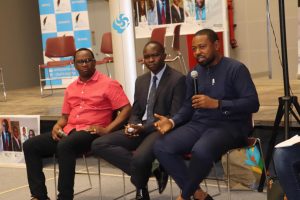
Lawrence Njagi, Gabriel Dinda, and Anthony Onugba
After the formalities surrounding the opening of the conference were observed, the AWC had the honour of hosting a sit-down session with AMKA Literary Forum whose mandate is to improve women’s participation in literature in Kenya. AMKA with the full support of Goethe Institute gave the chance for questions on publishing, the AWC, men’s involvement in literature, the African Writers Residency, as well as the origin story of the AWC. These questions were adequately answered by the duo of Gabriel Dinda and Anthony Onugba.
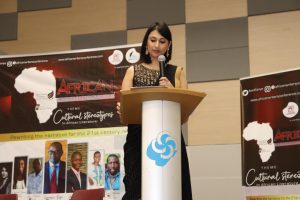
Sabah Carrim – Mauritius- Keynote Speaker
When these activities had come to an end, lead speaker, Sabah Carrim from Mauritius, led the conference in an intellectually stirring speech which stressed the importance of stereotypes in literature as well as our daily lives. Carrim pointed out that the demand for writers to create seemingly perfect stereotypes is simply “boring.” The Mauritian writer noted that it is the inconsistencies in characters that make for a story worth telling.
In making her points and advocacy for the use of stereotypes, Carrim noted that “stereotypes do to a certain extent depict our reality.” She mentioned having perused a Kenyan Daily and finding stereotyped stories found in literature splayed all over the pages of the Daily. A very interesting point made by Carrim was that “if critics and scholars are calling for the cultural stereotypes in African literature to be rewritten for the 21st-century reader, I ask of them to consider that in doing so, we writers will merely be replacing old stereotypes with new ones.” Carrim daringly stated that the creation of stereotypes is for the intellectually lazy and “it is dangerous to reproduce stereotypes in our writing unless we are breaking stereotypes.” In explaining how stereotypes are formed, she had this to say, “our brain creates shortcuts to deal with information it cannot process.”
Interestingly, other speakers on the panel discussion, Alex Nderitu of Kenya, Nnane Ntube of Cameroon and Nabilah Usman of Nigeria, all agreed with the direction set by the lead speaker. The panel discussion amongst all four speakers was led by the oversight of Dr Tom Odhiambo, a senior lecturer in literature in the Department of Literature at the University of Nairobi. Dr Odhiambo steered the conversation in the direction of the authenticity of African literature.
The four panellists left the audience with much food for thought, with Ntube saying “stereotypes should be used as a means of advocacy. If you want to write and be authentic, say what is real in the context of where you are from. What are you/people going through in your society? Let it reflect, from the characters to the plot. Your lens communicates.”
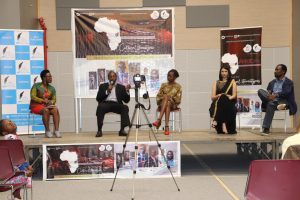
The Panellists
Mr Nderitu from Kenya began by agreeing with the lead speaker on the subject of those who create stereotypes. He said, “Stereotypes are for the intellectually lazy. As African writers, we can choose to push for positive stereotypes; let them override the negative.” He advocated for the use of vernacular in passing on messages in African literature. He pointed out the diluted potency of translated texts. In speaking on the nature of the African creative, he said, “real artists don’t try to look like artists. The artistry is all inside.”
Miss Usman had these words to say on the larger subject matter, “both the society and the writer shape the threshold of the story. It is impossible to completely exclude yourself from stereotypes. However, some stereotypes have already served their purpose; you need to create new things for the evolving generations.” On the topic of authenticity, she added, “an authentic story is the one you have experienced. You have no business telling what you have not been part of.”
Carrim who sat in on the panel contributed to the conversation. She had this advice to give, “Refine your skills; perhaps your storytelling is what lacks and leads you not to be chosen among the crème de la crème of the top. Writing is a process that takes time. We are the ones setting standards of the future.”
With these contributions coming out of different countries across Africa, it is obvious that literary conversations have sparked fires in contemporary African writers. It is clear to see that the concerns and the agreements all seem to take regardless of whether you’re a writer in Mauritius, Cameroon, Kenya or Nigeria.
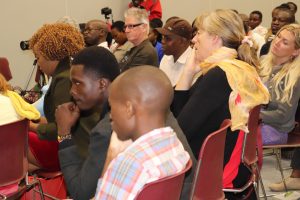
Some of the participants
After an engaging questions and answers session between the audience and the panellists, the 2019 AWC ended with the tradition of announcing the winners of the African Writers Award (AWA) sponsored by the African Writers Development Trust (AWDT). The honour of announcing the winners of this year’s four categories was granted to none other than Anthony Onugba, founder of the AWDT. The winners of each category were:
Children’s Literature – Judged by Nahida Esmail (Tanzania)
The Zappinator by Eme Ogbu (Nigeria)
Flash Fiction – Judged by Adah Bitiah Chembo (Zambia)
Breaking the Norm; Ungrateful Girl by Temani Nkalolang (Botswana)
Poetry – Judged by Kolabomi Adeko (Nigeria)
Pongwe’s Life by Andrea B Matambo (Zambia)
Short Stories – Judged by Sabah Carrim (Mauritius)
Hiding by Priscillar Matara (Botswana)
The AWDT was pleased to honour these diverse writers of diverse backgrounds united by their love for Africa and their drive to tell its stories. In the same vein, the AWDT presented the first-ever recipient of the Wakini Kuria Award for African Literature (Children’s Literature). The award was created in honour of Charity Wakini Kuria who was an avid lover of literature, a writer and supporter of literary endeavours, a strong believer in the possibilities of life, and until her death the Chief Editor of Writers Space Africa (WSA) Magazine. The privilege of being the first recipient of this premiere award was bestowed on Marjorie Moono Simuyuni from Zambia.
A few others from Kenya were awarded for their contributions to the growth and development of the African Literary Space. These are, the AMKA – Space for Women’s Creativity, Dr Tom Odhiambo, Jackson Biko (Blogger), and Khainga O’Okwemba (Literary enthusiast and broadcast journalist).
Before the guests left, they were entertained by moving poetry from some of Kenya’s finest,
As the conversation moves forward, preparations have begun in anticipation of the 2020 African Writers Conference. The country where the 2020 AWC will hold will be announced in January 2020.

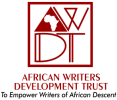


[…] Read – Breaking stereotypes in Nairobi – 2019 African Writers Conference in Perspective […]